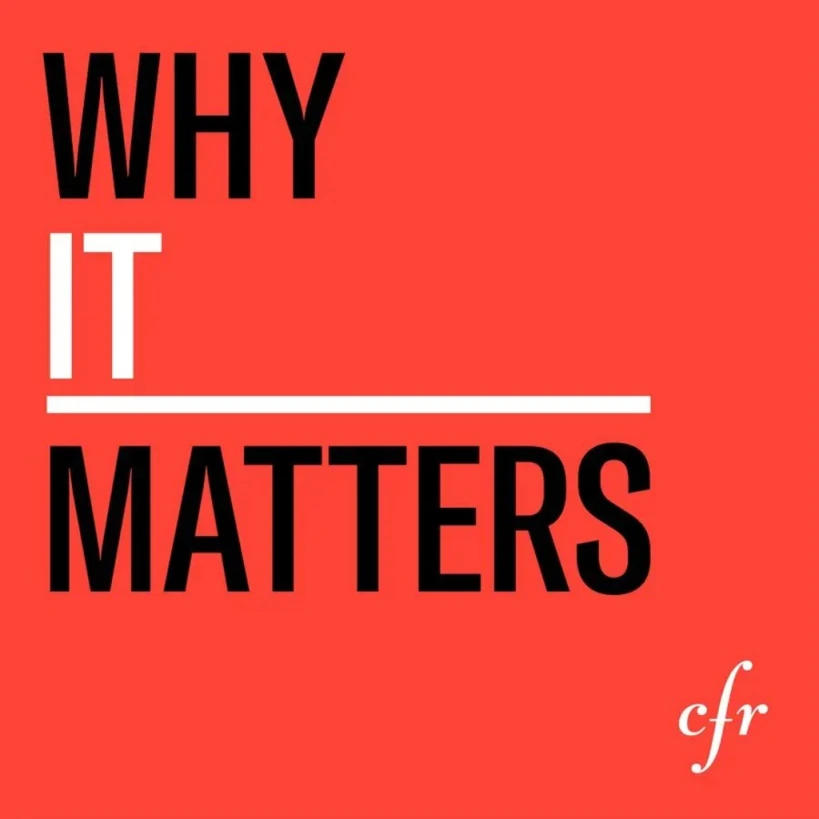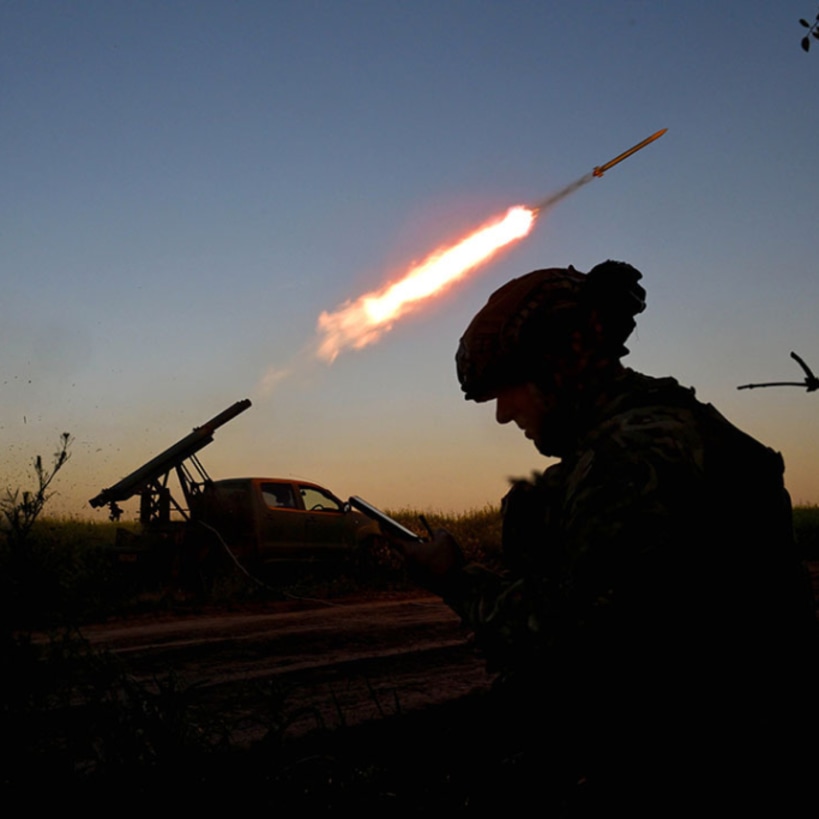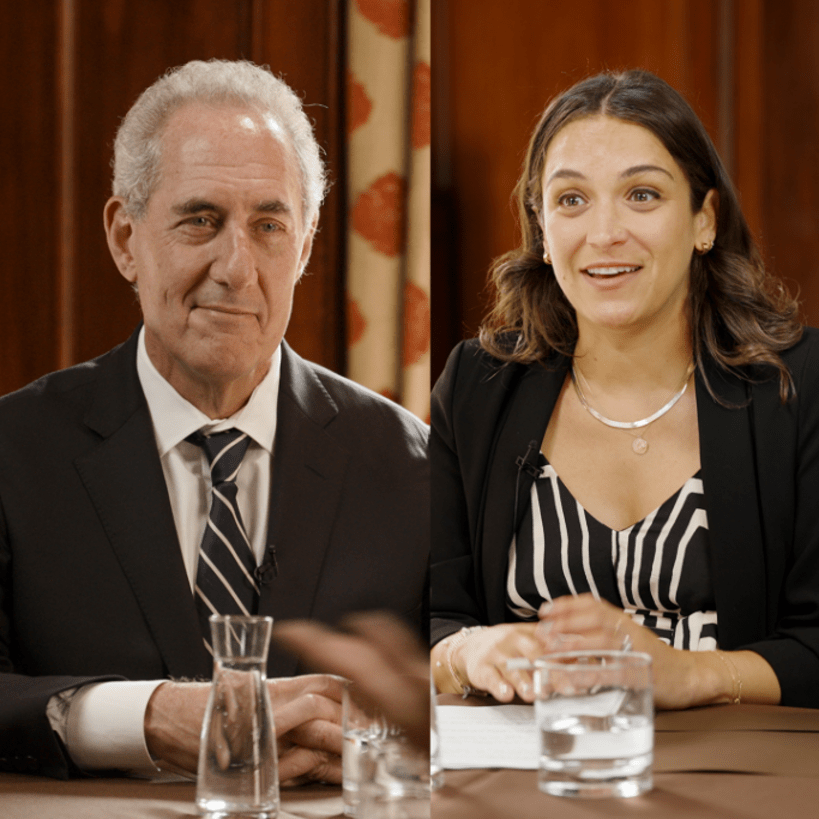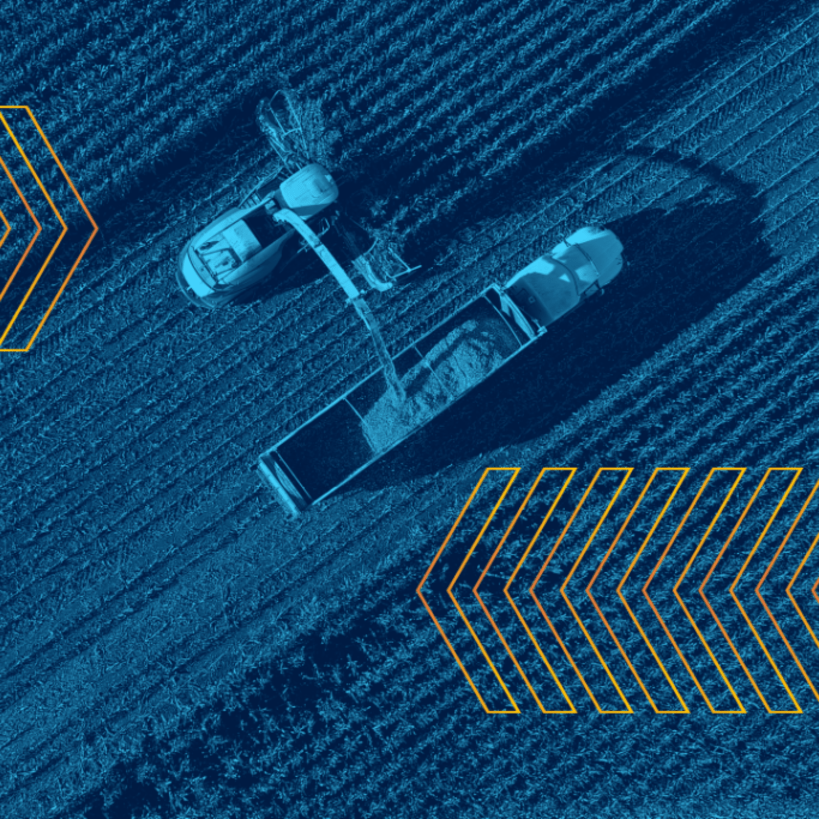Wearing the World Out
What’s the true cost of cheap clothes? Fast fashion has become a multibillion-dollar industry in recent decades, reshaping the world’s shopping habits. But the industry’s low prices disguise a staggering environmental cost.
Published
Host
- Gabrielle SierraDirector, Podcasting
Author
- Linda GreerSenior Global Fellow, Institute for Public and Environmental Affairs Beijing China
- Elizabeth SegranSenior Staff Writer, Fast Company
- Amber VallettaActivist, and founder, Master & Muse
Supervising Producer
- Asher RossLead Content Strategist
Audio Producer and Sound Designer
- Markus ZakariaAudio Producer & Sound Designer
Associate Podcast Producer
- Rafaela Siewert
Senior Producer
- Jeremy SherlickDirector of Video
Show Notes
These days it’s easy to shop for stylish and affordable clothing. With the development of fast fashion, stores are no longer bound by just four seasons; new items can be produced and sold every few weeks. But low prices and endless style choices have come at a massive environmental cost. In this episode, we explore how our clothes are manufactured, and the global trail of pollution they leave in their wake.
Read More
“The Troubling Ethics of Fashion in the Age of Climate Change,” Washington Post Magazine
“The price of fast fashion,” Nature
“It Takes 2,720 Liters Of Water To Make Just One T-Shirt,” Refinery29
“Remove Toxic Chemicals and Fabrics from Fashion’s Supply Chain,” Business of Fashion
Watch or Listen
“The true cost of fast fashion,” Economist
“The Ugly Truth Of Fast Fashion,” Patriot Act With Hasan Minhaj
“Fashion,” Last Week Tonight With John Oliver
Transcript
Okay, so the funny thing about recording a podcast from your home during a quarantine, is that you might end up spending a lot of time in your closet. It may seem strange, but you get the best sound in a small room with lots of padding.
So, the reason I’m telling you this, is because today’s episode is about clothes. And there’s no better place to talk about them than here, in my very full, very disorganized closet.
The thing is, I love shopping. Shopping makes me feel good. It’s exciting.
And the decision about whether or not to buy something has always boiled down to two things. One, how badly I wanted it, and two, whether or not I could afford it.
But what if the real cost of my clothes has nothing to do with the price tag?
I’m Gabrielle Sierra, and this is Why It Matters, today what is Fast Fashion? And what is it doing to our world?
MEAN GIRLS: Get in loser we’re going shopping.
SEX AND THE CITY: 40,000 on shoes and have nowhere to live?
QUEER EYE: Yas! Yas!
Emily MARIKO: 5:51 - 5:56 There are a ton of matching separates out there in stores right now and it’s really fun.
Shea WHITNEY: 0:40 - 0:43 Their trends are just always on point.
INMYSEAMS: 1:41 - 1:59 I grabbed I think 17 items ...the top was $14.99, the skirt was $34.99.
TEEN VOGUE: 0:00 - 0:05 We all love to shop and these days the newest styles and clothes are cheaper than ever.
John OLIVER: 0:21 - 0:26 We buy a lot of clothes.
MONTAGE: Fast fashion, fast fashion, fast fashion, fast fashion.
Gabrielle SIERRA: So what is fast fashion?
Linda GREER: So what fast fashion means is, just the rate of turnover of clothing in stores every several weeks.
I’m Linda Greer and I’m an environmental toxicologist. I study and advocate on industrial toxic chemical pollution.
So, back in the day, stores basically had four seasons and you went in seasonally to buy whatever clothing that you wanted. And your expectations were not such that if you went back in two weeks, you would buy it all over again.
SIERRA: Sure.
Greer: But then, with fast fashion, basically, this dramatic lowering of prices and a new sort of marketing model that draws consumers in, at any time to see what’s new, what we found was this immense acceleration of people buying clothing and people buying things that they might even never wear. Or only wear a few times, and it’s sort of a whole mindset shift from buying things we really love and buying things you think will last, sort of a timeless fashion, to use a really dated term. Which would probably be my parents‘ generation.
SIERRA: Right. As opposed to me when I’m like, “I’m going out tonight. I should get a shirt.”
GREER: I need something new.
SIERRA: Yeah.
GREER: Right. Not to mention, you know, I think the impact of Instagram where people feel like they need to look different on every shot.
SIERRA: Sure.
GREER: All of these things have had a very corrosive effect because, from an environmental standpoint, that’s just massive throughput. That’s just massive amounts of fabric, massive amounts of apparel, coming into these stores and it’s fair to say that almost no matter what these factories do if they’re making that much stuff, their carbon footprint, water use, and chemical use, and pollution is just very hard to curtail.
Elizabeth SEGRAN: When we think about how enormous the fashion industry is, it starts to become clear what kind of impact it has.
SEGRAN: Hi. I’m Liz Segran. I’m the senior staff writer at Fast Company magazine and I focus on the fashion industry. So for instance, in 2015, a hundred billion articles of clothing were manufactured. And if you think about how there’s just over seven billion people on the planet that is a lot of clothing per person.
A hundred billion pieces of clothing a year, and I’m probably buying more than my fair share.
And what have I gotten out of them? Looking around my closet there’s a lot of things I love, and still wear. But there are also some that I’ve never worn, and quite a few I’ve only worn once or twice. They served their brief purpose, and are now just kinda taking up space.
SEGRAN: Given how the fast fashion industry works, the clothes that are on the shelves are really sort of designed to be on-trend for the season. So that article of clothing that you buy, you know, you’re probably going to wear that for a season, two seasons, at most a couple of years and then you’re going to chuck that away. And so basically all of the carbon that was involved in shipping all of those items across the world, all of the labor that went into that, all of the chemicals that went into that, it basically goes into a very short-term purchase ultimately, and if you just think about that magnified by every human on the planet, you begin to get a sense of how enormous this industry is.
According to the United Nations Alliance for Sustainable Fashion, the $2.4 trillion apparel industry accounts for 8 to 10% of the world’s greenhouse gas emissions. That’s more than all international flights and maritime shipping combined. These are staggering numbers. But it’s important to take them with a grain of salt.
SIERRA: So this obviously sounds like a huge issue. How reliable are the statistics in this?
GREER: Ah. So this is the point in which the podcast needs to be a video so I can be wringing my hands so that people could see. The numbers that are associated with this industry are extremely poor quality. This has made me crazy because they’ve been poor quality for almost a decade.
SEGRAN: I think that the fashion industry is a very complex global industry, but there are other highly complex global industries out there like the transportation industry, like the oil industry, and yet we have relatively good figures about the impact that they have. And I think that that’s because these industries have been under scrutiny for longer and there are government imposed consequences on them. So as a result, there’s been more academic research, government research done to assess these industries, and this has not happened in the fashion industry.
Part of the problem is that production in the fashion industry is piecemeal. So, it’s likely that the materials in the shirt you’re wearing passed through middleman after middleman, across many countries, before you bought it.
The path varies, but let’s take a hypothetical cotton shirt. So, the cotton might be grown in Brazil, the U.S., or maybe even Uzbekistan. Once harvested it’s off to, say, China or India, to be twisted into yarn, or woven into fabric. Then it gets dyed. But it’s not over yet, the fabric is off to another location, maybe Bangladesh, Vietnam, or Honduras to be cut, trimmed, and assembled — this is all before it can be shipped to a store or your doorstep as a finished product.
All along the way, those materials are leaving a trail of wastewater, industrial chemicals, air pollution, and carbon.
SEGRAN: There are so many people involved with the fashion industry. And so basically companies are only working with a couple of players in their supply chain at any one time. And so if you ask a company to survey itself and provide data about the impact that it’s having, it’s only going to actually know a couple of the most recent steps in the process, right. And so I think it’s just a very, very difficult thing to do to sort of trace a garment all the way back to the raw materials that it was made of. I previously mentioned that a hundred billion articles of clothing were made in 2015. 15 years before that, in 2000 only 50 billion articles of clothing were manufactured. So in that 15 year period, the number of clothes manufactured globally doubled. And actually, according to surveys, there are some garments that some of us buy that are only worn eight to ten times before we throw them away.
SIERRA: I mean, what’s wild about this is that this seems to have gotten worse since the world has sort of woken up to climate change.
SEGRAN: We’re seeing all of these horrible things happening and we’re seeing exactly how bad the climate crisis is going to be, and yet this is still the infrastructure through which we buy our clothes.
It’s hard to learn that something you love is harming the world around you. And that made me want to talk to someone who loves fashion as much as I do, someone in the industry. So I did what anyone in my situation would do, I called a supermodel.
Amber VALLETTA: My name is Amber Valletta and I’m a model, an activist, and an entrepreneur.
Aside from being seen on the runway and on the cover of Vogue, Amber formed her own company called Master and Muse. And she had some really great advice.
VALLETTA: I started thinking about what I wanted to do with my life, my career. And sort of, you know, what kind of legacy did I want to leave behind for my son. So that was the impetus for me to start Master and Muse, which was an online store for responsibly made fashion and accessories, and sort of the thought leadership and work that I’ve been doing in fashion to get the fashion industry to become aware of sustainability, but also consumers and how we can think differently about our clothes. So I suggest, you know, in the next few days, you go into your closet and your dresser drawers and you look at what you have and you really take stock.
Ok so Amber told me to take stock, so let’s take stock. Okay, so there’s a lot of stuff in here. There is a little bit of a method to this madness. There’s shoes down there and there’s long sleeve shirts up here. And then to the right, we have pants. This shirt I have in three versions. Jumpcut to, I’ve worn the white one and not the other two at all.
So looking around at all this stuff I am realizing that a lot of it is, in fact, fast fashion, and a lot of it doesn’t get used, and that never bothered me before because it was cheap, or at least affordable, and yeah it’s starting to bother me now.
SIERRA: So, okay, I know the clothes we wear travel all across the world while they’re being made, but could you walk me through, sort of, the environmental impact at each of those stages? How is my shirt polluting the world?
GREER: Yeah. So would you like to talk about a cotton shirt? So, first of all, cotton is a very difficult crop to grow. It is a very thirsty crop. That means it needs a lot of water. It is hammered by insects, so it requires a lot of pesticides. And in order to get a good yield, it really likes to have fertilizer. And so when you look at the cultivation of cotton, it is not a walk in the park. In fact, that crop alone uses more than 15% of all the insecticides we use for any crop anywhere in the world.
SIERRA: Wow.
GREER: It then needs to be, sort of processed into fibers, and prior to doing the spinning, it needs to be scoured and sort of hammered away with a lot of detergent and scouring agents to take off the natural waxes that come along with the cotton ball. So, you know, it goes through a ginner and then it gets really hammered away and then it finally gets spun. In order to get woven, it needs to be coated with a chemical because the fibers themselves are not very strong. They’re not strong enough to be woven without sizing on them. Sizing is sort of like a starch that gets put on, that later when it gets washed off, is very bad for the rivers that receive it. And then when it’s finally woven that starch has to be taken off, and we’re finally ready to dye it and finish it.
SIERRA: Wow. That’s already a lot of chemicals you just mentioned.
GREER: It’s already a lot, and I gotta tell ya, one more thing about cotton, is that it doesn’t like to accept dye. And so they need to add more chemicals to allow those things to come together, including salt. So, overall for a fiber that gets, I think for many people, sort of a free ride, it is a problematic fiber.
The UN estimates that a single pair of jeans requires a kilogram of cotton. And because cotton tends to be grown in dry environments, producing enough for that pair of jeans consumes about 10 years of drinking water for one person.
When scaled up, this can be devastating. In 2014, NASA revealed images showing that the Aral Sea had effectively disappeared after rivers were diverted for cotton farms in Uzbekistan.
And fabric production doesn’t just consume water, it pollutes it too. Roughly 8,000 synthetic chemicals are used across the world to produce textiles. Accounting for 17 - 20% of industrial water pollution.
SIERRA: So, it really seems like, you know, this shirt leaves a chemical and carbon trail all the way across the world.
GREER: Yes. So I would like you to think about your clothing as having embedded carbon in them. Think about it looks just like a shirt, but how much energy went into that shirt that you’re complicit with that carbon emission even if it didn’t happen in your country. And then similarly, it has embedded water use and it has embedded chemical use and we don’t see those embedded, sort of footprints, in any of the things that we buy. And, by the way, it’s very difficult to get that information. So I certainly don’t blame consumers for not having a little quantitative calculator in their head of where their biggest embedded carbon lies. But when they buy clothing, there’s a lot of environmental impacts that was left in the wake of the manufacturing of that stuff.
SEGRAN: I actually think that it’s the accumulation of all of those steps that is the problem, and I think that that’s partly why it’s hard for the average person to get a sense of how enormous the problem is and sometimes we see news stories about things like, “oh, you know, what is the impact of e-commerce?” Right, like “how much energy is used to ship those products to us?” That is one tiny part of this whole process, the only part that we are able to visualize or make sense of. And I actually think that part of the reason that the fashion industry has gotten away with so much environmental destruction is because the entire supply chain is so broken up and there’s so many middlemen along the way that it’s really hard to point a finger at any one part of this chain and make somebody take responsibility for that.
SIERRA: What sort of regulation is happening currently?
SEGRAN: There’s hardly any at all.
GREER: This is a really low-tech industry, it is operating much the way it operated, you know, decades ago. I think that the difference is that it’s operating in the developing world, in economies like China, in transition. So, when it was operating here in the United States and Europe, which was really only about 15 or even 20 years ago it was operating under a very mature environmental regulatory system that was in place by our government, the Environmental Protection Agency, that had rules, regulations, it had inspections and enforcement and the industry was very well controlled. What happened then was, you know, the big wave of globalization where our manufacturing left our shores, sort of in search for cheaper, cheaper, goods, which now we all enjoy purchasing.
SIERRA: That’s so interesting. You don’t think about it moving backwards that way.
GREER: No. And I have to say, you know, I worked for the Natural Resources Defense Council for almost 30 years. We observed the pattern of globalization, of course. We watched the trade agreements, et cetera, get negotiated and we did push back on some of the weaknesses in terms of environmental matters in those agreements. But I have to say, we did underestimate the environmental impact of globalization. We really didn’t think that, you know, more than 80% of our, let’s say, textile factories would leave this country.
SEGRAN: I think a lot of brands are at this point trying to self-regulate. You see lots of brands making promises about how they’re, you know, trying to be carbon neutral or carbon positive, and there are other brands that are saying, “Oh, we’re not going to use anymore virgin or new plastic in our clothing, we’re going to use recycled plastic.”
GREER: A lot of these companies have a small effort underway. Some of them are just greenwashing.
SIERRA: And what’s greenwashing?
GREER: Greenwashing is when they pretend that they care, but they don’t care.
VALLETTA: You know, these companies that get on the bandwagon about, you know, a new packaging that might be eco-friendly, or maybe they claim to be organic but they’re only partially organic, or sometimes you find out that they’re not doing a whole lot.
Linda and Amber are right, phony sustainability won’t actually help the environment in the long run. But some people think that greenwashing might actually be a good sign for the short term.
SEGRAN: My take on this is that I actually think that it’s really great that brands are now feeling pressure to make these claims about sustainability. I think that is an important first step because for a long time brands were manufacturing with highly polluting practices with impunity. Now, I see this as a sign that these brands are responding to consumers’ desire for more eco-friendly manufacturing and more eco-friendly clothing.
SIERRA: Right. I mean, the idea that it’s a marketing tool at all seems to be a good sign.
SEGRAN: I think so, yeah, and so now the next step is just holding these brands into account and kind of putting pressure on them to raise the bar and raise their standards of what it really means to be eco-friendly. What we need, is we need governments to force companies to take responsibility for the pollution that they’re producing and the impact that they’re having because right now, you know, it’s citizens who are paying the price for all of this destruction.
There is reason to be hopeful. Some countries, like France, have started making moves in the right direction in addressing the problem.
SEGRAN: So in France, there’s a woman. She is part of the Ministry of Ecological and Inclusive Transition, which is basically France’s department in the government that’s devoted to sustainability, and her name is Brune Poirson. And she has made the fashion industry kind of her pet project. Some of the things that she’s done for instance is she has banned fashion companies from destroying their own merchandise. Now, that should seem like an obvious thing for a brand not to be doing, but it’s actually pretty common in the fashion industry particularly among high fashion brands to basically destroy their merchandise at the end of a season, anything that’s unsold because they don’t want those products to end up on a second-hand market or to be discounted because that will impact the brand equity, right.
SIERRA: Wow. That’s awful by the way.
SEGRAN: It’s so terrible. So these beautiful luxury handbags have been essentially incinerated and burnt, for a long time. But actually this is also happening in the fast fashion sector, because in the fast fashion sector they have a completely different problem which is that they tend to produce so many clothes every season that they just have this huge stockpile of things that they just can’t get rid of. There’s no way for them to sell it all or donate it all. So they’re also burning it. And so if you think about all of the steps that went into producing something that will just ultimately get incinerated, it’s just horrible to think about. So in France, they have banned this practice so companies cannot do this anymore. And that actually has a ripple effect, where these companies then need to be a lot more responsible about how much they’re producing in the first place.
SIERRA: Right, right. Like you don’t want it to go out on the open market, you know, for half price, fair enough, then don’t produce as much.
SEGRAN: Exactly. And so this is going to put the onus on them to be much better at tracking supply and demand.
Aside from a few ambitious policy makers, there are also scientists and designers who are trying to find creative solutions to the problem.
One of these solutions is algae. Marine microalgae can be used to make clothes that are biodegradable and far less energy and water intensive than other fabrics. Or how about leather made from mushrooms? No cows, no methane, no problem. And there’s a lot more to come. But, for the time being, it can feel like all the existing options are harmful. So what can we do in the meantime?
GREER: So, you could ask your favorite companies, rhetorically, on Twitter or send them an e-mail, how transparent is your supply chain?
Do you evaluate your suppliers for their environmental performance before you qualify them to make your stuff? What are the consequences of egregious environmental behavior? Have you benchmarked your suppliers for who has the lowest carbon footprint? And make some very tangible requests of them, to try to pressure them to up their game and be real.
VALLETTA: Really take stock in the things that could maybe be altered and be made more modern for today. Simply like changing a hem length. Guys, you can cut off those pants and make them into shorts.
SIERRA: Don’t encourage them to make jean shorts. No.
VALLETTA: But simple things. Or, like if you have a favorite pair of jeans, they might be kinda cool with a patch. You know, dying a blouse, with some natural dye. Just rethinking what you have and making it last longer. You know, play around with your wardrobe and you can make subtle changes. Have swaps with your friends. Also, if you’re going to clean out your closet, don’t throw anything in the trash, find a recycling bin for clothing.
So I’m still looking around my closet, and I’m still seeing things I love. But, you know, I’m having a hard time now un-seeing the global cost of each piece, the path each piece took to get to me. Whether that’s wastewater, whether that’s carbon in the air, whether that’s dried up rivers. It all is here hanging in front of me too. And you know Amber’s right, I can’t undo what I’ve already bought, they’re now mine, they are part of my footprint, as well as part of my closet. But I guess the best possible thing I can do is get the best use out of the things that I have here, with me now. Ok so there’s a bunch of stuff in here that I guess I can update a bit, but there’s also a lot in here that I can give to my friends, which is the best part, so let’s start making some piles for my friends. Ok well first of all obviously this striped shirt would look really good on Frida...(trails off).
SEGRAN: I think we’re at the very beginning, and this is what scares me because there’s so much that we know now about how quickly the Earth is going to be impacted by climate change. And so we really need to speed this whole process up if we’re really going to effect change.
SIERRA: Okay, so without a blockbuster statistic, how do you convey the urgency of this problem?
GREER: So, people need to learn to live without that blockbuster statistic, but here’s what for sure is true. The tremendous amount of clothing that they buy is having a tremendous impact. They can be assured that if they buy less, they will have less impact and if the clothes they buy come from companies that are more responsible, it will be even better. So they don’t need specific numbers to know that, basically, the magnitude of this problem is very large, very significant and there’s something they can do about it.
Look, there’s no industry more sensitive to consumer preferences than fashion. And if we can truly make waste uncool, if we can stigmatize needless production, then the industry, and the regulators who have the power to govern it, can change.
So… buy accordingly.
Want to learn more about fast fashion and sustainability? Visit CFR.org/whyitmatters and take a look at the show notes for this episode.
We know there’s a lot going on out there, and while this podcast is going to be focusing on other topics, our sister podcasts The World Next Week and The President’s Inbox are providing in-depth coronavirus coverage, and we really encourage you to take a listen.
Interested in saying hi to the Why It Matters team? Send us an email at [email protected].
Be sure to subscribe to the show on Apple Podcasts, Spotify, Stitcher, or wherever you get your audio. And if you like the show, leave us a review!
Why It Matters is a production of the Council on Foreign Relations. The show is created and produced by Jeremy Sherlick, Asher Ross, and me, Gabrielle Sierra. Our sound designer is Markus Zakaria and our assistant producer is Rafaela Siewert. Robert McMahon is our Managing Editor, and Doug Halsey is our Chief Digital Officer.
Original music is composed by Ceiri Torjussen. Special thanks go to Richard Haass and Jeff Reinke.
For Why It Matters this is Gabrielle Sierra signing off. See you next time!






